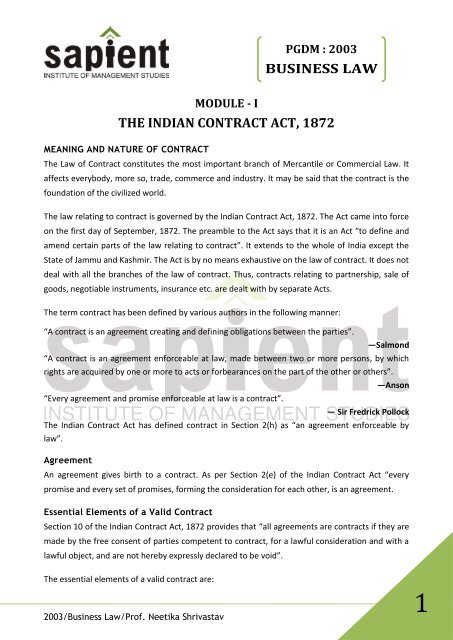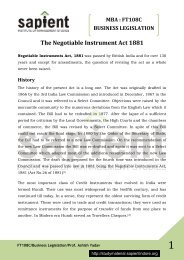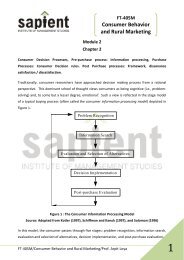BUSINESS LAW THE INDIAN CONTRACT ACT, 1872
BUSINESS LAW THE INDIAN CONTRACT ACT, 1872
BUSINESS LAW THE INDIAN CONTRACT ACT, 1872
You also want an ePaper? Increase the reach of your titles
YUMPU automatically turns print PDFs into web optimized ePapers that Google loves.
PGDM : 2003<br />
<strong>BUSINESS</strong> <strong>LAW</strong><br />
MODULE - I<br />
<strong>THE</strong> <strong>INDIAN</strong> <strong>CONTR<strong>ACT</strong></strong> <strong>ACT</strong>, <strong>1872</strong><br />
MEANING AND NATURE OF <strong>CONTR<strong>ACT</strong></strong><br />
The Law of Contract constitutes the most important branch of Mercantile or Commercial Law. It<br />
affects everybody, more so, trade, commerce and industry. It may be said that the contract is the<br />
foundation of the civilized world.<br />
The law relating to contract is governed by the Indian Contract Act, <strong>1872</strong>. The Act came into force<br />
on the first day of September, <strong>1872</strong>. The preamble to the Act says that it is an Act “to define and<br />
amend certain parts of the law relating to contract”. It extends to the whole of India except the<br />
State of Jammu and Kashmir. The Act is by no means exhaustive on the law of contract. It does not<br />
deal with all the branches of the law of contract. Thus, contracts relating to partnership, sale of<br />
goods, negotiable instruments, insurance etc. are dealt with by separate Acts.<br />
The term contract has been defined by various authors in the following manner:<br />
“A contract is an agreement creating and defining obligations between the parties”.<br />
—Salmond<br />
“A contract is an agreement enforceable at law, made between two or more persons, by which<br />
rights are acquired by one or more to acts or forbearances on the part of the other or others”.<br />
—Anson<br />
“Every agreement and promise enforceable at law is a contract”.<br />
— Sir Fredrick Pollock<br />
The Indian Contract Act has defined contract in Section 2(h) as “an agreement enforceable by<br />
law”.<br />
Agreement<br />
An agreement gives birth to a contract. As per Section 2(e) of the Indian Contract Act “every<br />
promise and every set of promises, forming the consideration for each other, is an agreement.<br />
Essential Elements of a Valid Contract<br />
Section 10 of the Indian Contract Act, <strong>1872</strong> provides that “all agreements are contracts if they are<br />
made by the free consent of parties competent to contract, for a lawful consideration and with a<br />
lawful object, and are not hereby expressly declared to be void”.<br />
The essential elements of a valid contract are:<br />
2003/Business Law/Prof. Neetika Shrivastav<br />
1
PGDM : 2003<br />
<strong>BUSINESS</strong> <strong>LAW</strong><br />
1. An offer or proposal by one party and acceptance of that offer by another party resulting<br />
in an agreement — consensus-ad-idem.<br />
2. An intention to create legal relations or an intent to have legal consequences.<br />
3. The agreement is supported by a lawful consideration.<br />
4. The parties to the contract are legally capable of contracting.<br />
5. Genuine consent between the parties.<br />
6. The object and consideration of the contract is legal and is not opposed to public policy.<br />
7. The terms of the contract are certain.<br />
8. The agreement is capable of being performed i.e., it is not impossible of being performed.<br />
What is an Offer or a Proposal?<br />
A proposal is also termed as an offer. The word ‘proposal’ is synonymous with the English word<br />
“offer”. An offer is a proposal by one person, whereby he expresses his willingness to enter into a<br />
contractual obligation in return for a promise, act or forbearance. Section 2(a) of the Indian<br />
Contract Act defines proposal or offer as “when one person signifies to another his willingness to<br />
do or abstain from doing anything with a view to obtaining the assent of that other to such act or<br />
abstinence, he is said to make a proposal”. The person making the proposal or offer is called the<br />
proposer or offeror and the person to whom the proposal is made is called the offeree.<br />
Acceptance<br />
A contract emerges from the acceptance of an offer. Acceptance is the act of assenting by the<br />
offeree to an offer. Under Section 2(b) of the Contract Act when a person to whom the proposal is<br />
made signifies his assent thereto, the proposal is said to be accepted. A proposal, when accepted<br />
becomes a promise..<br />
Intention to Create Legal Relations<br />
The second essential element of a valid contract is that there must be an intention among the<br />
parties that the agreement should be attached by legal consequences and create legal obligations.<br />
If there is no such intention on the part of the parties, there is no contract between them.<br />
Agreements of a social or domestic nature do not contemplate legal relationship. As such they are<br />
not contracts.<br />
Consideration<br />
Need for Consideration<br />
Consideration is one of the essential elements of a valid contract. The requirement of<br />
consideration stems from the policy of extending the arm of the law to the enforcement of mutual<br />
promises of parties. A mere promise is not enforceable at law.<br />
2003/Business Law/Prof. Neetika Shrivastav<br />
2
PGDM : 2003<br />
<strong>BUSINESS</strong> <strong>LAW</strong><br />
TYPES OF <strong>CONTR<strong>ACT</strong></strong><br />
1. Void Agreement<br />
2. Voidable Contract<br />
3. Illegal Agreement<br />
When contract becomes void<br />
An agreement not enforceable by law is void ab initio - Section 2(g).A contract which ceases to be<br />
enforceable by law becomes void when it ceases to be enforceable - Section 2(j)<br />
A contract becomes void when, by reason of some event which the promisor could not prevent,<br />
the performance of the contract becomes impossible, e.g., by destruction of the subject- matter<br />
of the contract after the formation of the contract.<br />
RESTITUTION<br />
When a contract becomes void, it is not to be performed by either party. But if any party has<br />
received any benefit under such a contract from the other party he must restore it or make<br />
compensation for it to the other party. A agrees to sell to B after 6 months a certain quantity of<br />
gold and receives Rs 500 as advance. Soon after the agreement, private sales of gold are<br />
prohibited by law. The contract becomes void and A must return the sum of Rs. 500 to B.<br />
F<strong>LAW</strong>S IN <strong>CONTR<strong>ACT</strong></strong><br />
There may be the circumstances under which a contract made under these rules may still be bad,<br />
because there is a flaw, vice or error somewhere. As a result of such a flaw, the apparent<br />
agreement is not a real agreement.<br />
The chief flaws in contract are:<br />
1. Incapacity<br />
2. Mistake<br />
3. Misrepresentation<br />
4. Fraud<br />
5. Undue Influence<br />
6. Coercion<br />
7. Illegality<br />
8. Impossibility<br />
Flaw in Consent<br />
The basis of a contract is agreement, i.e., mutual consent. In other words, the parties should mean<br />
the something in the same sense and agree voluntarily. It is when there is consent, that the<br />
parties are said to be consensus ad idem i.e. their minds have met. Not only consent is required<br />
but it must be a free consent. Consent is not free when it has been caused by coercion, undue<br />
influence, misrepresentation, fraud or mistake.<br />
2003/Business Law/Prof. Neetika Shrivastav<br />
3
PGDM : 2003<br />
<strong>BUSINESS</strong> <strong>LAW</strong><br />
CERTAIN RELATIONS RESEMBLING THOSE OF <strong>CONTR<strong>ACT</strong></strong> (QUASI <strong>CONTR<strong>ACT</strong></strong>S)<br />
Nature of Quasi-Contracts<br />
A valid contract must contain certain essential elements, such as offer and acceptance, capacity to<br />
contract, consideration and free consent. But sometimes the law implies a promise imposing<br />
obligations on one party and conferring right in favour of the other even when there is no offer,<br />
no acceptance, no consensus ad idem, and in fact, there is neither agreement nor promise. Such<br />
cases are not contracts in the strict sense, but the Court recognises them as relations resembling<br />
those of contracts and enforces them as if they were contracts, hence the term quasi- contracts<br />
(i.e., resembling a contract).<br />
DISCHARGE OR TERMINATION OF <strong>CONTR<strong>ACT</strong></strong>S<br />
A contract is said to be discharged or terminated when the rights and obligations arising out of a<br />
contract are extinguished.<br />
Contracts may be discharged or terminated by any of the following modes:<br />
1. performance, i.e., by fulfilment of the duties undertaken by parties or, by tender;<br />
2. mutual consent or agreement.<br />
3. lapse of time;<br />
4. operation of law;<br />
5. impossibility of performance; and<br />
6. breach of contract.<br />
<strong>CONTR<strong>ACT</strong></strong> OF GUARANTEE<br />
Meaning of Contract of Guarantee<br />
A contract of guarantee is a contract to perform the promise, or discharge the liability of a third<br />
person in case of his default. The person who gives the guarantee is called the Surety, the person<br />
for whom the guarantee is given is called the Principal Debtor, and the person to whom the<br />
guarantee is given is called the Creditor (Section 126). A guarantee may be either oral or written,<br />
although in the English law, it must be in writing.<br />
Extent of Surety’s Liability<br />
The liability of the surety is co-extensive with that of the principal debtor unless the contract<br />
otherwise provides (Section 128). A creditor is not bound to proceed against the principal debtor.<br />
He can sue the surety without sueing the principal debtor. As soon as the debtor has made default<br />
in payment of the debt, the surety is immediately liable. But until default, the creditor cannot call<br />
upon the surety to pay. In this sense, the nature of the surety’s liability is secondary.<br />
2003/Business Law/Prof. Neetika Shrivastav<br />
4
PGDM : 2003<br />
<strong>BUSINESS</strong> <strong>LAW</strong><br />
Kinds of Guarantees<br />
A contract of guarantee may be for an existing debt, or for a future debt. It may be a specific<br />
guarantee, or it may be a continuing guarantee. A specific guarantee is given for a single debt and<br />
comes to an end when the debt guaranteed has been paid.<br />
A continuing guarantee is one which extends to a series of transactions (Section 129). The liability<br />
of surety in case of a continuing guarantee extends to all the transactions contemplated until the<br />
revocation of the guarantee. As for instance, S, in consideration that C will employ P in collecting<br />
the rents of C’s Zamindari, promises C to be responsible to the amount of Rs. 5,000 for the due<br />
collection and payment by P of these rents. This is a continuing guarantee.<br />
Rights of Surety<br />
A surety has certain rights against the creditor, (Section 141) the principal debtor (Sections 140<br />
and 145) and the co-securities (Sections 146 and 147). Those are—<br />
1. Surety’s rights against the creditor<br />
2. Rights against the principal<br />
3. Surety’s rights gains co-sureties<br />
<strong>CONTR<strong>ACT</strong></strong> OF BAILMENT<br />
A bailment is a transaction whereby one person delivers goods to another person for some<br />
purpose, upon a contract that they are, when the purpose is accomplished to be returned or<br />
otherwise disposed of according to the directions of the person delivering them (Section 148). The<br />
person who delivers the goods is called the bailor and the person to whom they are delivered is<br />
called the bailee.<br />
Bailment is a voluntary delivery of goods for a temporary purpose on the understanding that they<br />
are to be returned in specie in the same or altered form. The ownership of the goods remains with<br />
the bailor, the bailee getting only the possession. Delivery of goods may be actual or constructive,<br />
e.g., where the key of a godown is handed over to another person, it amounts to delivery of goods<br />
in the godown.<br />
Gratuitous Bailment<br />
Bailment for Reward<br />
Bailees Particular Lien (Section 170)<br />
Particular and General Lien<br />
2003/Business Law/Prof. Neetika Shrivastav<br />
5
PGDM : 2003<br />
<strong>BUSINESS</strong> <strong>LAW</strong><br />
Termination of bailment<br />
Where the bailee wrongfully uses or dispose of the goods bailed, the bailor may determine the<br />
bailment (Section 153.)<br />
As soon as the period of bailment expires or the object of the bailment has been achieved, the<br />
bailment comes to an end, and the bailee must return the goods to the bailor (Section 160).<br />
Bailment is terminated when the subject matter of bailment is destroyed or by reason of change<br />
in its nature, becomes incapable of use for the purpose of bailment.<br />
A gratuitous bailment can be terminated by the bailor at any time, even before the agreed time,<br />
subject to the limitation that where termination before the agreed period causes loss in excess of<br />
benefit, the bailor must compensate the bailee (Section 159).<br />
A gratuitous bailment terminates by the death of either the bailor or the bailee (Section 162).<br />
Finder of Lost Goods<br />
The position of a finder of lost goods is exactly that of a bailee. The rights of a finder are that he<br />
can sue the owner for any reward that might have been offered, and may retain the goods until<br />
he receives the reward. But where the owner has offered no reward, the finder has only a<br />
particular lien and can detain the goods until he receives compensation for the troubles and<br />
expenses incurred in preserving the property for finding out the true owner. But he cannot file a<br />
suit for the recovery of the compensation [Section 168].<br />
<strong>LAW</strong> OF AGENCY<br />
Definition of Agent (Section 182)<br />
An agent is a person who is employed to bring his principal into contractual relations with thirdparties.<br />
As the definition indicates, an agent is a mere connecting link between the principal and a<br />
third-party. But during the period that an agent is acting for his principal, he is clothed with the<br />
capacity of his principal.<br />
Creation of Agency<br />
A contract of agency may be express or implied, (Section 186) but consideration is not an essential<br />
element in this contract (Section 185). Agency may also arise by estoppel, necessity or ratification.<br />
1. Express Agency<br />
2. Implied Agency<br />
3. Agency by Estoppel (Section 237)<br />
4. Wife as agent<br />
2003/Business Law/Prof. Neetika Shrivastav<br />
6
PGDM : 2003<br />
<strong>BUSINESS</strong> <strong>LAW</strong><br />
Extent of Agent’s Authority<br />
The extent of the authority of an agent depends upon the terms expressed in his appointment or<br />
it may be implied by the circumstances of the case. The contractual authority is the real authority,<br />
but implied authority is to do whatevers incidental to carry out the real authority. This implied<br />
authority is also known as apparent or ostensible authority, Thus, an agent having an authority to<br />
do an act has authority to do everything lawful which is necessary for the purpose or usually done<br />
in the course of conducting business.<br />
Responsibilities of Principal to Third-parties<br />
The effect of a contract made by an agent varies according to the circumstances under which the<br />
agent contracted. There are three circumstances in which an agent may contract, namely—<br />
the agent acts for a named principal;<br />
the agent acts for an undisclosed principal; and<br />
the agent acts for a concealed principal.<br />
Termination of Agency<br />
An agency comes to an end or terminates—<br />
1. By the performance of the contract of agency; (Section 201)<br />
2. By an agreement between the principal and the agent;<br />
3. By expiration of the period fixed for the contract of agency;<br />
4. By the death of the principal or the agency; (Section 201)<br />
5. By the insanity of either the principal or the agent; (Section 201)<br />
6. By the insolvency of the principal, and in some cases that of the agent; (Section 201)<br />
7. Where the principal or agent is an incorporated company, by its dissolution;<br />
8. By the destruction of the subject-matter; (Section 56)<br />
9. By the renunciation of his authority by the agent; (Section 201)<br />
10. By the revocation of authority by the principal. (Section 201)<br />
2003/Business Law/Prof. Neetika Shrivastav<br />
7








